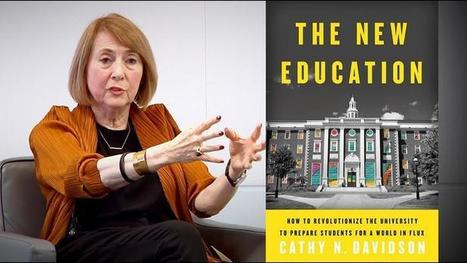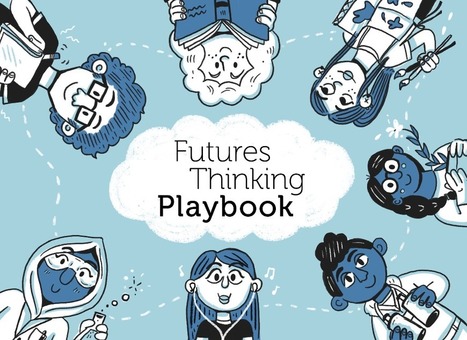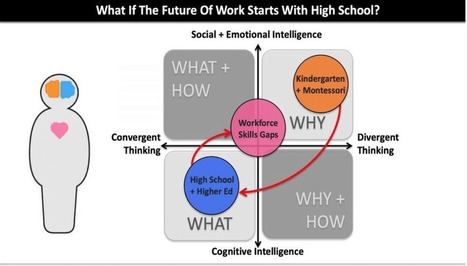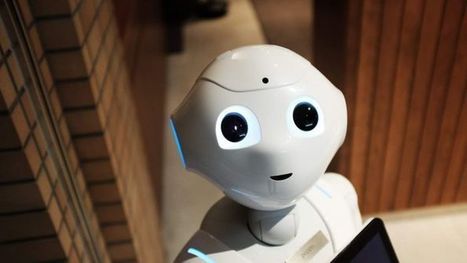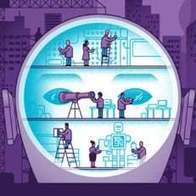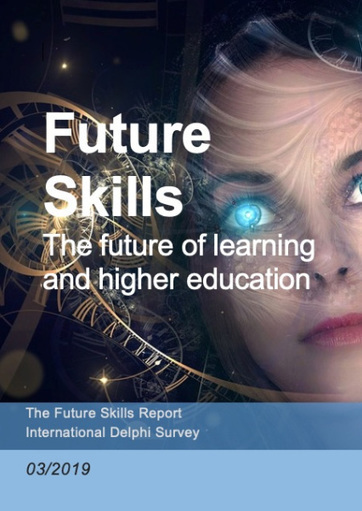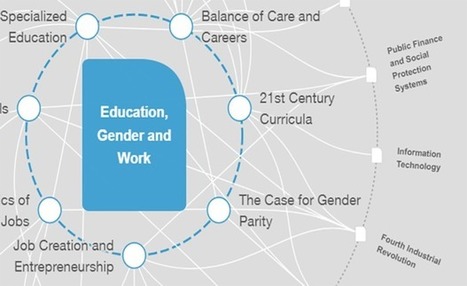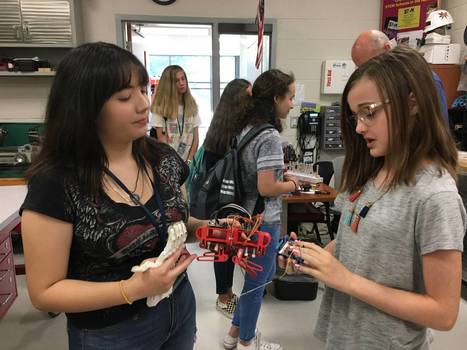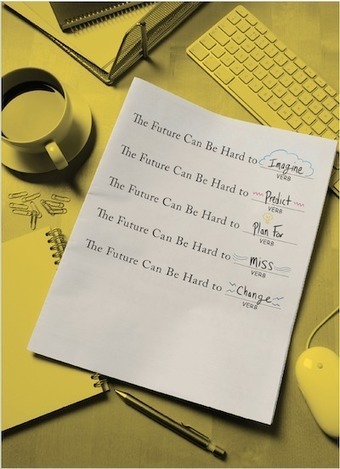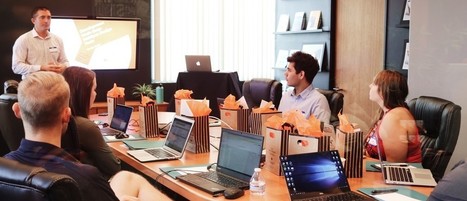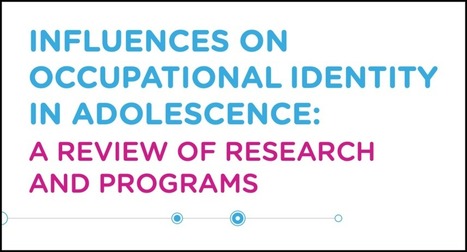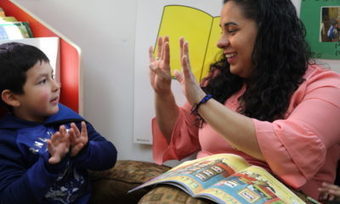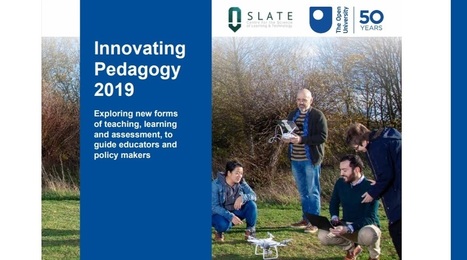 Your new post is loading...
 Your new post is loading...
If an “Age of Alternatives” truly takes hold, students and families are likely to find themselves facing a broader range of choices as new schooling options and models—some remaining physical, others becoming increasingly virtual or blended—emerge. Within these spaces, new pedagogies are likely to not just expand but multiply as educational innovators, fueled by today’s spirit of entrepreneurism, try to differentiate their approaches from one another.
Via NextLearning
Digital transformation (Dx) is a series of deep and coordinated culture, workforce, and technology shifts that enable new educational and operating models and transform an institution’s operations, strategic directions, and value proposition.
Dx is being driven by technology trends and changes that are enabling a new approach to everything from how digital architectures are being incorporated to how campus leaders interact with the IT organization, all targeting improved student outcomes, more effective teaching and learning methods, new research capabilities, and an evolution in business models. Dx requires agile and flexible leaders at all levels who can enable the college or university to rapidly and efficiently achieve its strategic aims.
Yet somehow we have been led to believe that at work, we must diminish our humanity, behaving (and appearing) like robots who are prized for their automation and conformity. When we get to the office, we leave our true selves at the door, ramp up our “work” mindset and keep our human traits muzzled until we leave for the evening. The belief that we need to be as efficient as an LED bulb and as knowledgeable as Wikipedia, as productive as an assembly line and as human as a doorknob, might have worked in the industrial age, but we have been in the relationship economy for decades.
Today, we can’t afford to forget the one ingredient that’s essential for business success— humanity. After all, relationships are the currency of business. More than ever, business is a truly human endeavor.
The Futures Thinking Playbook is for educators who want to introduce their students to rigorous and creative futures thinking. The book is organized into challenges and plays and guides students in understanding why thinking about the future is important, conducting futures-oriented research, creating scenarios, and identifying their preferred futures and actions to bring that might bring that future about. Educators and facilitators can use the entire playbook as a unit of study in their classrooms or as the basis of an academic enrichment program, or they can select individual modules from the playbook.
The Renaissance we need today must begin with education. It requires that we value education as a life-long endeavour in which learning becomes the constant thread weaving its way through our lives. Only by becoming self-navigating life-long learners will we overcome the epistemological threat posed by the post-truth brigade. Our continuous engagement in learning will allow us to rise up to whatever new challenges confront us and transform each into new opportunities.
But we need a new model of education. Traditional schooling served purposes now extinct. Transfer of the essential knowledge required by citizens of the industrial era is a goal that education must no longer serve. Education for the new Renaissance must enrich our capacities for creativity, critical thinking, analysis, experimentation, exploration and discovery. In an era where information is ubiquitous, the last thing a learner needs from their teacher is more information. Rather we need to learn to manage this flood of data and understand how it may be transformed into wisdom. We need to become problem finders who are imbued with empathy such that we see the wrongs in the world and through our awareness of our agentic capacities take action to make amends.
"High School As The Fulcrum To Impactful Change
Previously considered too late for intervention, new evidence from neurological science, as noted in Age of Opportunity: Lessons from the New Science of Adolescence, now suggests critical brain development occurs during the adolescent years. Further, while identity development occurs throughout one’s lifetime, Age of Opportunity author Laurence Steinberg notes that adolescence is the first time that individuals contemplate how our identity may affect our lives. As the future of work requires an internally validated identity born of self-awareness and coupled with learning agility and adaptability, this all points to re-imaging high school."
Key points:
The report estimates each industrial robot eliminates an average 1.6 manufacturing jobs
There will be a disproportionate toll on lower-skilled workers and on poorer local economies
The report suggests governments tackle this by increasing worker training and increasing welfare, including a universal basic income
Standardised tests such as NAPLAN, when used as a basis for managing performance through the data they provide, can change the role and conduct of teachers. Research shows this can result in:
a narrowed curriculum focus, with teaching time disproportionately devoted to tested subjects, marginalising other areas
a shift from student-centred to teacher-centred learning
aligning teaching with text-based standards and teaching to the test
teachers’ professional competence unjustly being open to public scrutiny and blame
privileging quantitative data over teachers’ professionalism and knowledge.
Teachers engulfed by an audit culture, where results of standardised tests are viewed as the sole indicator of the effectiveness of their teaching, can deem such practices as necessary.
A government perspective: Human Capital Trends 2019
Key trends impacting the future of work in government
The 2019 Global Human Capital Trends report continues 2018’s focus on government as the original social enterprise. For the government workforce, success is not about “the bottom line”—it’s about service to citizens.
Abstract
Research on future skills is the current hot topic of the day with fundamental changes in the job market due to a number of powerful drivers. While many studies focus on the changes brought through digital technologies, they relate future skills directly to digital skills, which - as important as they are - only represent one side of the future skill coin. The results presented from this Delphi survey are taking a broader approach and go beyond digital skill demands. The approach elaborates on an experts’ informed vision of future higher education (HE), taking into account the demand for future skills, outlines the four signposts of change which will shape the learning revolution in higher education and presents a first model of future skills for future graduates.
Experts have argued that global education systems have not changed in hundreds of years and that a factory model no longer works. Whether we’re talking about the 265 million children currently out of school, the children in school but doing poorly or the children entering “quality” programs currently, what competencies needed to thrive and how learning systems develop them require reflection and reform.
I believe that every global challenge we face can be conquered if we are willing to pioneer new models of lifelong learning and assessment. These new models would assume that modern learning requires a co-agency approach and recognizes that because of the unique time in which we live, students, teachers, parents and communities must all work together if learners and communities are to flourish.
Part of the challenge facing educationalists is that technological change will call for skills that fall outside of age-old approaches to curriculum design and teaching. Emotional intelligence, creative thinking, and collaboration are just three core aptitudes that will be needed, but which cannot easily be taught in a traditional classroom environment. “Updating curriculum should always be on the agenda,” says Jaime Saavedra of the World Bank, quoted in the WEFFI report. “But it is incredibly urgent to invest in changing the behaviour of teachers and improving what happens inside the classroom. Learn more / En savoir plus / Mehr erfahren:
Via Gust MEES
The topics of submissions to this special issue are anticipated to include, but not be limited to, these themes. For more detailed information on each theme please visit the ShapingEDU website. We welcome a diverse set of submissions: full original research papers, short reports or briefs, review papers, case studies, essays, or methodology papers. Full paper and methodology paper submissions should not exceed 8000 words, all other submissions should not exceed 6000 words (excluding references).
The aim of this special issue is to provide a publication venue for the work that individuals and groups such as the ShapingEDU community and others like it are engaging in around the world. With an increasing need to prepare and design for the future, we hope this special issue will serve as the seed to shape the futures of learning in the digital age.
Submission Information/Timeline: Interested contributors are invited to submit manuscripts aligned with the special issue theme for review by August 1, 2019. Full paper and methodology paper submissions should not exceed 8000 words, all other submissions should not exceed 6000 words (excluding references). All materials should be submitted electronically through the CIE website and follow the Journal’s submission guidelines.
|
Sanitizing past (and present) controversies is no way to learn
By Eilise McLaughlin
August 27, 2019
In my English class this year, we read Heart of Darkness by Joseph Conrad. It is a book about Belgian imperialism in Africa from the perspective of a European man.
The book is complex and inspires a lot of debate. Upon finishing the novella, my class had a discussion about whether or not the book's depiction of colonialism was racist. The consensus was that it was, but that left us all with the question, "Should this book still be read in schools?"
As educational software improves over time, it will both streamline many administrative tasks and start to rival educators’ abilities at teaching basic literacy and numeracy. But elementary school teachers do much more than take attendance, prepare handouts and teach foundational knowledge and skills.
But disrupting traditional colleges and universities is a tall order. For bootcamps to do so, they will have to do more than initially serve students who are not being served by traditional higher education with a more affordable, convenient offering that is perceived as primitive and with a technology enabler that allows them to improve even as they make money and don’t cause the majority of traditional colleges and universities to compete directly. After establishing this foothold, they will have to go “up-market,” and serve more of higher education beyond technology and an on-ramp into a career.
School districts are pushing career exploration into middle and lower grades, convinced the preparation necessary for tomorrow’s jobs needs to begin earlier. Helping students connect what they are learning to careers will not only deepen their engagement, say educators, but also help them make more informed decisions about their educational paths.
Once your mental time travel pathways are primed, turn your attention to the future. As you try to imagine yourself having an experience in a possible future, start with questions a journalist would ask: What is happening? When is it happening and what time of day, exactly? Where are you—what do you see and hear in your environment? Who is there with you? How do you feel? Describe it in the present tense, as if it is happening to you right now. “I am inside a self-driving car, in what used to be called ‘the driver’s seat.’ The seats are black leather. The windows are up and the air-conditioning is on. The car still has a new car smell, because autonomous vehicles have only been widely available for public use for a few months now. I’m eating an egg salad sandwich—why not? My hands are free.” Keep going and fill out as many details as you can. Don’t worry about telling a story—the “plot” isn’t as important as setting a scene and recording as many details as you can. And don’t pressure yourself into having any amazing insights about the future when you practice this technique. Insight comes later. Think of specificity training as a crucial core-strengthening exercise to give you the mental muscles for creative foresight.
Today’s evolving business landscape puts organizations under constant pressure to innovate. This has made digital transformation a top priority for businesses. For some, digital transformation efforts are yielding positive results. However, many companies are struggling to reap the benefits of digital transformation, as becoming a digital enterprise is no small undertaking. It requires comprehensive, systemic change.
True digital transformation requires a lot more than implementing a new website or mobile strategy. It entails executing across a broad programme of digital initiatives, or “digital pivots”: adopting flexible, secure IT infrastructure; mastering the use of data; cultivating and engaging with an ecosystem of technology partners; implementing intelligent, automated workflows; training programmes to focus on digital competencies and making judicious use of flexible, contingent talent models to rapidly access in-demand skills; delivering a seamless customer experience; and expanding the organizations’ array of business models and revenue streams.
Do you wonder how learning works? Are you looking to design learning environments to support a range of learners?
The Digital Promise Research Map can help. The Research Map is a hub for learning sciences research which connects education leaders, policymakers, and technology developers with research findings that can inform their work. This site features actionable summaries and videos on key topics like STEM learning and family engagement, as well as an interactive visualization of education research.
I am excited to announce the publication of “Influences on Occupational Identity in Adolescence,” a review of research and programs that help youth develop a vision of their future workforce selves. This report, published by the Connected Learning Lab of University of California, Irvine, was a collaborative effort involving my co-authors Mizuko Ito, Stephen Campbell Rea, and Amanda Wortman. The report was made possible through the generous funding of the Bill and Melinda Gates Foundation and through an ongoing dialogue with the Gates Foundation network of scholars and practitioners.
In “Influences on Occupational Identity in Adolescence,” we build from foundational research on career pathways, the future of work, and connected learning to better understand what barriers and influences are tied to occupational identity outcomes. Equity was a guiding theme as we looked for examples of scholarship that addressed the challenges and opportunities facing diverse groups of students. We began our research with several questions: (1) What influences students’ decisions about what careers they want to pursue in the future? (2) How do educational identities develop into occupational identities? (3) How do schools and programs prepare students for their future careers? (4) How can educators support equity and inclusion for marginalized youth through occupational identity development?
The last decade has seen widespread ‘degree inflation.’ But a growing movement of employers, workers and training groups offers a rebuke to a culture that exalts a bachelor’s as the gold standard for upward mobility
This story is a part of our Map to the Middle Class project, in which readers ask questions about educational pathways to financial stability and then we investigate. This question comes from Susanna Williams: Jobs don’t require college degrees. Employers do. Why do employers ask for college degrees as a qualification? To submit your question or vote on our next topic, click here.
The Learning Compass 2030 defines the knowledge, skills, attitudes and values that learners need to fulfil their potential and contribute to the well-being of their communities and the planet.
The Innovating Pedagogy Report 2019 identifies strong moves towards more creative, informal teaching methods – such as teaching through wonder, playful learning and even building empathy by bringing a baby in to the classroom – allowing learners to be more experimental and inventive in how they explore topics.
The report, compiled by experts from The Open University and the Centre for the Science of Learning & Technology (SLATE) in Norway, identifies ten innovations that will influence education internationally over the coming years.
The education-to-employment gap continues to be the subject of much discussion, often surfacing in policy debates across both the developed and the developing world. The gap, which centers on skill acquisition, has led to relatively high levels of youth unemployment worldwide, as is visible in recent data from the Organisation for Economic Co-operation and Development (OECD) and the 2018 QS report "The Global Graduate Skills Gap in the 21st Century," which calls the skills gap "a global and significantly widespread issue." "The Future of Jobs Report 2018" from the World Economic Forum (WEF) also elaborates on the problem by emphasizing the skills with which the current and future workforce must be equipped in order to succeed in an increasingly technology-driven workplace, including communication, problem solving, and critical thinking, along with the ability to be agile and empathetic and possess a growth-oriented mind-set.
|
 Your new post is loading...
Your new post is loading...
 Your new post is loading...
Your new post is loading...





